
It was in the waking up; of becoming aware again of human life-consciousness. The intensity of the dreams, alive and vibrant only moments earlier but now fading into the distant haze, echoes and mirrors of the extraordinary world of the sleeping, dreaming brain.
This human life-consciousness should be the starting point of everything each day. How it is nutritionally feed and watered, how is it stimulated, how is it kept safe, how is it developed, the quality of the housing and environment it finds itself in, the character of the labour that connects the head, heart, hands and humour, whether that labour is free or coerced.
Instead alarm clocks are ringing in the homes of the sleeping workforce. Outside in the streets an industrial conveyor belt of vehicle movements, tired and angry drivers, petrol-taste fumes in the air, a thousand hidden killer particles for the city children to breath in. There are lines of people being marched by a hidden force to the railway stations and bus stops, jammed together in jostling movements, surrounded by strangers, trying to return to the mysteries of their hallucinogenic dream memories. Through the revolving glass doors of office buildings, the steel doors of factories and warehouses, the gates of ports and oil refineries, the piled up retail units in the shopping centres, opening the cold doors of the cabs of trains, lorries, tug boats, cranes, delivery vans and trains.
Human life consciousness stirs in the slums of Jakarta and Mumbai, a day lies ahead of hustling and labour-toil. Some of the prostitutes are only children. Some of the children are working in mines, some are swimming in polluted waters in search of items they can sell or recycle. The night shifts are putting away their hospital uniforms, the day shifts are changing the drip feeds of the patients, elderly people lie on trolleys in corridors, exhausted from hours of sleeplessness in the neon light.
Everything is flattened out. The sides of the buildings are strictly measured lines of glass and steel, software runs in millions of lines of code, mirror switching in the networks, packets of data moving at near light speeds. Monitors, red lights flashing, green lights and the 300,000 tonne ship inches slowly away from the edge of the quay; 24,000 containers stacked high. Constant ship movements through the channel. Oil tankers, container ships, car carriers, bulk carriers, liquid natural gas. From Rotterdam Maasvlakte to Port Klang in Malaysia, DP World London Gateway to Tanger, Morocco, to New York, Le Havre, around the world and back again.
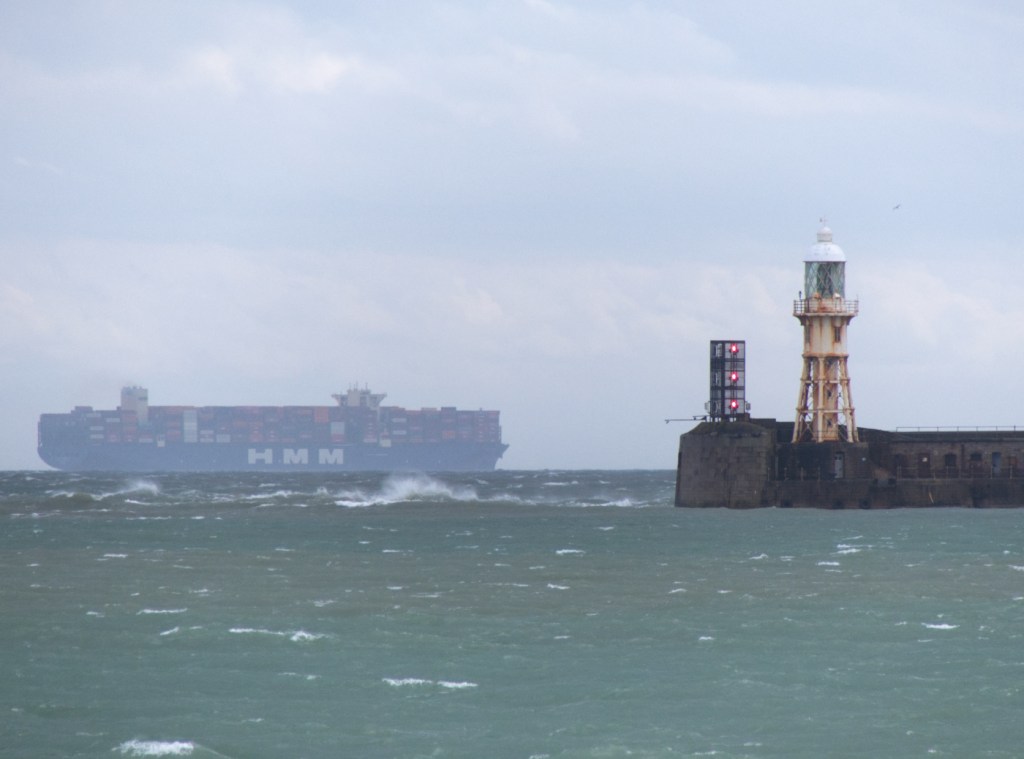
I’m living local, underground, unobserved, unobtrusive. It’s worth noting the detail of the day, the small actions, the bits of conversation, the way that words are used, the noise of cars, the smell of petrol, the rubbish in the alley, the way that nature is being polluted at a local and global scale.

In the supermarket the woman in front of me turns around and says, ‘oh, excuse me’ and goes off to collect an item she’s just remembered. She’s dressed in a Bohemian way, bright and colourful with big jewellery.
‘That’s ok’, I say, ‘I do that all the time. It’s annoying when you get home and discover a missing item’. And then I point to a large box of Jaffa cakes in my pile of shopping on the black rubber conveyor belt.
‘I nearly forgot these’
‘Oh’, she says, ‘my friend’s dog had to be put down the other day and he loved those. So they gave him one to nibble and then he was put to sleep’.
I thought this would be a rather good way to go.
I bumped into a friend and we sat and had a catch up in the wine bar. Neither of us drinking, it wasn’t even noon. I’d been in A&E for 14 hours and still don’t feel right. In all that time I must have had 10 minutes of conversation with the health staff. They are just too busy and under far too much pressure. And then get home and have to listen to the government. I listen to the Today some mornings when I’m getting reading for work. I am astonished that anyone can believe a word that the politicians say.
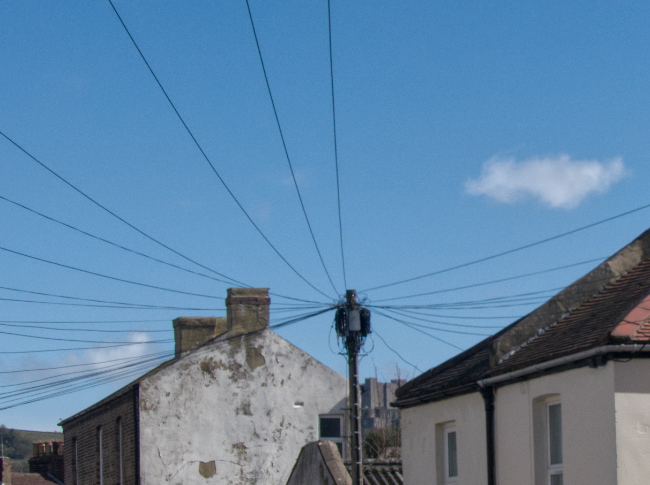
Anyway, he gave me a lot of good advice. No sugar, raw vegetables, lemon water, apple cider vinegar, only small amounts of meat, rest, ‘look after yourself’. He was kind and gentle and spoke in such a way of quiet authority that he made it seem achievable. He cheered me up in a way the chaotic responses from the over-worked doctor’s surgery failed to do.
I spent the rest of the day reading EP Thompson’s magnificent book, The Making of the English Working Class in preparation for a Radical Walk, ‘Praed Street & the Liberty Tree‘.
On Monday morning a trip to the letter box to post my mum’s birthday card. She was born in the Weimar Republic, grew up under the fascists in Germany, experienced the Russian military invasion and occupation of Silesia and was expelled from her home along with 10 million other people. All before she was 16. She has the most extraordinary stories to tell. Every person I’ve known who has been involved in war hates war. And yet there are people who have never been anywhere near a war who are full of war.

It was a lovely spring morning, blue skies, a cheery breeze in the air, the sense that winter is over and that the crops will grow and the world will come to life again. A small straw coloured dog caught my eye as it gadded about as best it could at the end of a lead. It’s left leg was covered by a large green bandage and it was having to hop around on three legs. (A few days later I had a dream which featured a three legged lamb and a tiger cub. The tiger cub bothered me. Where was it’s mother? Would she think I was trying to kidnap it?).
‘Hurt it’s leg?’ I asked the woman holding the other end of the lead. She was wearing black trousers and black slippers. She raised her eyebrows.
‘What he’s done’, she said, ‘is I put him out for a wee, but then he’s come back in, got on my bed and peed all over it’.
We both looked at the culprit.
‘So I shouted, he’s jumped off the bed and broke his leg hitting the door’.
This was all delivered in that style that is sometimes necessary when it is important to retain a semblance of a straight face while trying not to laugh.
We talked dog and vet stories and then wished each other friendly goodbyes.
This was quite a busy walk considering the post box is only a few hundred metres away.
I then bumped into a left activist I know. We had a chat about Unite in the Community, the left-green alliance and the recent anniversary of the Herald of Free Enterprise disaster. And then I posted my letter.
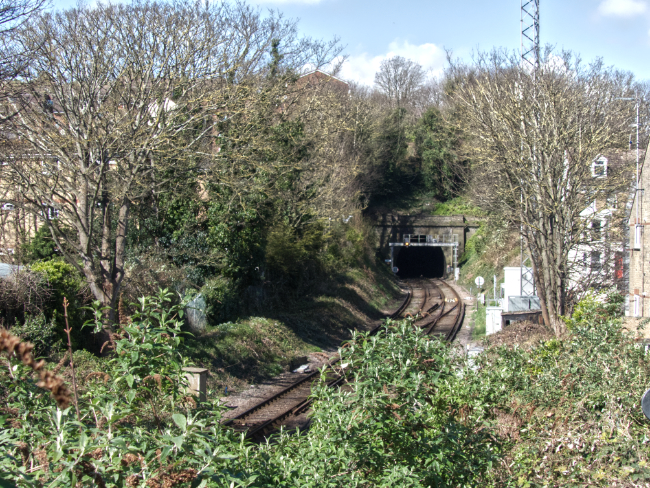
Near to the delivery office is one of those shops that isn’t really a ‘junk’ shop, nor is it an ‘antique shop’. It’s a bit like being in someone’s house who has never thrown anything out. I’m on the look out for a pitchfork. They’re quite expensive to buy new and besides, a used one will have more character.
The man in this emporium – yes that’s it, an emporium – responded to my question as to whether he had a pitchfork by leading me through closely stacked furniture, clothes, standard lamps and much else into an open yard. There were tin baths, spades, an ancient pick axe, stacks of terracotta tiles, a broken broom. We went back into the shop area.
He’s one of those stocky types that look as if they are made of cast iron, asbestos and the muscles of some ancient mystical beast. The exposed skin of his face and hands and forearms were as suntanned as a seafarer’s from the day’s of sail might have been. He looked at me with intensely sparkling blue eyes.
I explained that when agricultural labourers and artisans demonstrated in the late 18th century they would put a loaf of bread on the end of a pitchfork, with black crepe. This is well described by Thompson. And that I’m planning a walk in London in the near future and thought a pitchfork with a loaf of bread on it and black crepe might be a good bit of fun. What with the way the world is and everything, we need a bit of that old Radical and Jacobin spirit abroad again. A sort of festival of the oppressed for the modern world.
He said if a pitchfork comes in he’ll let me know.

There’s a lot goes on with these small local trips. I had to go to Morrisons to get some packing tape. I like it as a supermarket. The wonky fruit and potatoes are excellent value and they sell small, pocket size notebooks which are just right. I have dozens and dozens of them. They are never properly sorted and I can never find the latest one when I’m just about to go out so am constantly mixing them up. It doesn’t really matter to me. I only take the briefest notes in them. But those notes are invaluable for later writing.
I was once in Morrisons and couldn’t find something, spinach maybe? It was definitely a green vegetable. I asked one of the shop floor workers. She gently took hold of my wrist and led me to what I wanted.
If I’d been thinking more about shopping I might have got some other things but it wasn’t that sort of trip. I couldn’t be bothered to use the automatic tills, I never can. I don’t like them and to this day I have no idea where the bagging area is. Regardless of where I put my shopping it’s never in the right place.
When it was my turn to be served the woman at the checkout looked like she was about to swear.
‘Are you alright?’ I asked
‘Some people!’ she said, in a clenched teeth way
‘It says one pound seventy five and they kept asking me if that was right. I don’t set the flippin’ prices!’
‘There’s far too much intervention all the time’ I said, ‘everyone’s an expert on everything’.
I can’t remember how we got into this but she told me that whenever she goes to the doctor, she looks everything up on the internet first,
‘I said to the doctor, don’t you get fed up with all your patients doing this?’
‘Yes’ he said.
The woman on the parallel check out turned round to join in the conversation and we heard one of her doctor’s stories. The people in both their queues were obviously listening. There was something about this that caught my attention. Shop workers are often secretly watched and have to be careful about their attitudes and behaviours and what they say and don’t say. But here they were both exerting a level of autonomy that’s not in the affected labour script. There was a subtle and great power to this. The way that time and motion were being bent and subverted was tangible.
‘Mind you’, I said, ‘I once went to the doctor and when I explained the problem they then looked it up on the internet’.
With that they both burst out laughing and turned round on their swivel chairs and went back to work scanning each day, thousands of commodity-items.
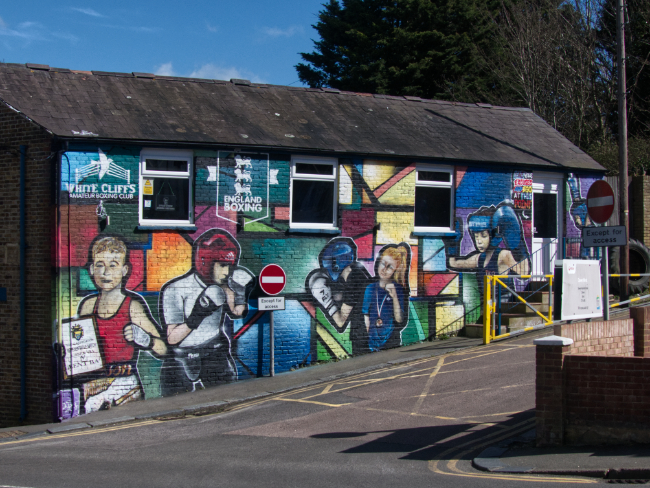
The weather forecast suggest this will be the last sunny day for some time. Strong winds and rain are expected tonight and through tomorrow and intermittently for the rest of the week. Work was dragging me down. The relations of production can be physically and mentally exhausting at times. I needed air and I could spend my lunchtime walking up the hill to take some pictures of a couple of Anderson shelters. They could be used to illustrate this piece of writing.
A young woman pushing a pram stopped to ask me, in a friendly manner, why I was taking photographs.
‘I’m in interested in the history of the area and the buildings’. I pointed to a two storey brick building that might have been a workshop with storage space.
‘You can see it’s got the remains of a pulley up there. They must have hauled things up and stored them up there’.
‘You know, I’ve never noticed that’, she said
‘And that used to be a pub’.
There were many pubs round here at one time. It would have been a very different place. There would have been huge amounts of social interaction and local conversation.
She was so bright and breezy with her baby.
‘Enjoy your day’, she said, with a lovely inflection of voice.

The path near the Anderson shelters was busy. A dog walker, then another dog walker, a woman and a man, him on a scooter, ‘thanks mate’, as I stood back to let them past. Was I going to be able to take this photo? Another woman, this time with two dogs. I stood back again.
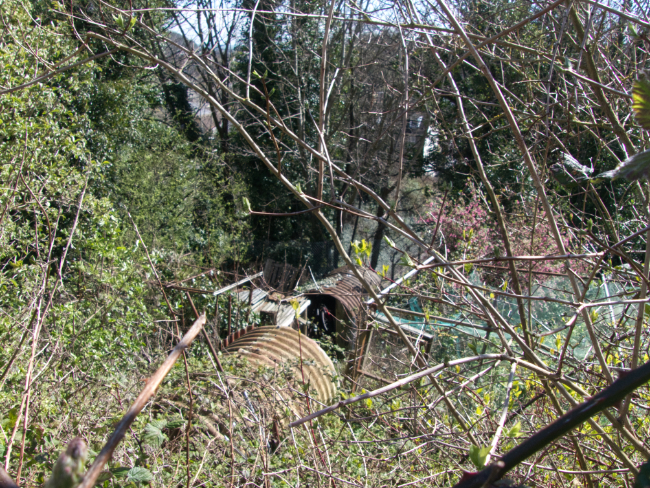
‘There’s a couple of Anderson shelters down there’ I said.
‘This used to be lovely’, she replied. ‘This bloke did all the work. Full of roses. You can see the cherry tree’.
I hadn’t noticed that.
‘But when he died, it’s just been neglected’.
‘Who owns it?’ I asked,
‘The council. Not sure anyone’s doing anything with it now’.
It is overgrown and neglected.
‘There’s a bike in that shelter’, she said, ‘there might even be something living there’.
And then she started talking about homelessness and how bad it is that so many people don’t have somewhere proper to live.
We shared anecdotes about the poor quality of the new build housing that springs up here and there.
‘It’s all about money’, she said, in the sort of voice that simmers with anger. She looked at me full on as she said this, her blond-grey hair blowing in the wind across her face. Whose side are you on? What do you think about this state of affairs? A lot of politics are carried by unspoken gestures. Street politics. If only this could be organised, articulated, amplified, socialised.
Each evening after work, more and more of The Making of the English Working Class. EP Thompson constantly brings the people to life, alive inside a socialist theory in which there are two classes in opposition. The cold calculating yeoman, parsons and well to do of the English villages and market towns who organised into small groups to enclose the commons; while at the same time passing laws and using police spies, deportations, hangings, fines and imprisonment to stop the agricultural labours, mechanics, artisans and factory workers from combining.
Thompson captures the way the wind blows across the fields in the early spring and how a labouring gang on their way to dig and hoe might stop to enjoy the blossom in the hedgerows. He captures the nuances of the way the small things can mean so much to the poor. The ability to graze a cow by the side of the road, the liberty to glean the fields to supplement the family diet, all the ways people find to live around the edges.
How the ideas of rights and justice and fairness are so deeply engrained in the minds of the working classes. How again and again the working classes have attempted to organise and have been met always with state persecution, chicanery, lies, counter revolution. And yet how again and again, each new generation has not given up. How the culture and language and style of the working class continues to change but how the underlying oppression of work coercion and exploitation of labour remains. How the capitalists work so hard to extort the very wages the workers are paid through housing costs, transport costs, energy costs, food costs, disproportionate taxation and a thousand other ruses.

The local streets have proven to be the perfect place to study Thompson’s thesis of the making of the working class. In terms of history, in terms of class relations, and in terms that we need to know where we come from. In order to understand where we want to go.

You must be logged in to post a comment.